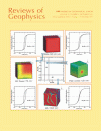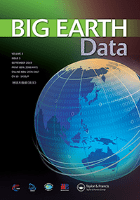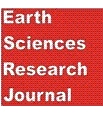
REVIEWS OF GEOPHYSICS
Scope & Guideline
Advancing Geophysical Research, One Review at a Time.
Introduction
Aims and Scopes
- Interdisciplinary Geophysical Research:
The journal focuses on a wide range of interdisciplinary topics that include geology, climatology, oceanography, and environmental science, emphasizing the interconnectedness of geophysical phenomena. - Advanced Methodologies and Technologies:
It highlights innovative methodologies and technologies in geophysical research, such as remote sensing, data assimilation, and computational modeling, which are critical for understanding complex Earth systems. - Climate Change and Environmental Impact Studies:
A significant emphasis is placed on understanding climate change, its impacts, and adaptation strategies through comprehensive reviews of current research and methodologies. - Paleoclimate and Historical Analysis:
The journal publishes reviews related to paleoclimate studies that explore historical climate variations and their implications for current and future climate scenarios. - Natural Hazards and Risk Assessment:
Research on natural hazards, including earthquakes, floods, and volcanic activity, is a core area, focusing on risk assessment and mitigation strategies.
Trending and Emerging
- Climate Change Adaptation and Mitigation:
There is an increasing focus on climate change adaptation strategies and mitigation efforts, highlighting the role of geophysics in understanding and addressing climate-related challenges. - Innovations in Remote Sensing Technologies:
Recent publications emphasize advancements in remote sensing technologies, particularly satellite-based observations, which are crucial for monitoring environmental changes and natural disasters. - Earth System Interactions and Feedback Mechanisms:
Emerging themes include the study of interactions and feedback mechanisms within Earth systems, particularly how land, ocean, and atmosphere processes are interconnected. - Data-Driven Approaches in Geophysics:
The integration of big data analytics and machine learning techniques in geophysical research is gaining traction, reflecting a broader trend towards data-driven methodologies. - Sustainability and Ecosystem Services:
There is a rising interest in the contributions of geophysical processes to ecosystem services and sustainability, particularly in the context of human impact and conservation efforts.
Declining or Waning
- Traditional Geological Studies:
There is a noticeable decrease in reviews focused solely on traditional geological studies, as the journal pivots towards more interdisciplinary approaches that integrate geology with other scientific fields. - Static Models of Earth Systems:
The reliance on static models of Earth systems appears to be waning, with a growing emphasis on dynamic, real-time modeling approaches that account for ongoing changes in geophysical processes. - Limited Focus on Regional Studies:
The journal has shifted away from region-specific studies, favoring broader, global perspectives and integrative analyses that address transboundary geophysical phenomena.
Similar Journals

Geofizika
Bridging Ideas in Earth and Planetary SciencesGeofizika, an esteemed journal published by the Andrija Mohorovičić Geophysical Institute at the University of Zagreb, presents a significant platform for research in the fields of geophysics and Earth sciences. With an Open Access model established since 1984, this journal ensures that scientific knowledge is accessible to a broad audience, encouraging collaborations and the free exchange of ideas. Geofizika has steadily evolved through its converging years from 1989 to 1999 and has been active from 2003 to the present, reflecting its commitment to advancing geophysical research. The journal has been recognized for its contributions to Earth and Planetary Sciences and has acquired respectable ranks in various categories; notably, it holds a Q4 status in Geophysics as of 2023. Researchers, professionals, and students will find Geofizika a valuable resource for the latest discoveries and methodologies in geophysics, supporting the academic community in expanding the frontiers of knowledge in these vital scientific domains.

METEOROLOGY AND ATMOSPHERIC PHYSICS
Charting New Territories in Atmospheric PhysicsMETEOROLOGY AND ATMOSPHERIC PHYSICS is a premier journal published by SPRINGER WIEN, dedicated to advancing the study of atmospheric phenomena and weather-related sciences. With an ISSN of 0177-7971 and an E-ISSN of 1436-5065, the journal has established itself as an important contributor in the field, particularly noted for its contributions in atmospheric science, holding a Q3 ranking in the 2023 category quartiles. Covering a wide array of topics from meteorological modeling to the physics of the atmosphere, it serves researchers, professionals, and students alike, facilitating the dissemination of significant findings and innovative research. The journal’s acceptance of articles until 2024 encourages a continuous influx of knowledge, and despite its lack of Open Access, it plays a crucial role in enriching the academic landscape for those engaged in Earth and planetary sciences, holding a commendable rank of 78 out of 148 in Scopus. Located in the scenic city of Vienna, Austria, the journal is positioned to harness the vibrancy of the academic community, providing a platform for valuable insights that can drive forward the field of meteorology and atmospheric physics.

INTERNATIONAL JOURNAL OF EARTH SCIENCES
Exploring the Depths of Earth and BeyondINTERNATIONAL JOURNAL OF EARTH SCIENCES, published by Springer, is a leading journal in the field of Earth and Planetary Sciences, distinguished by its Q1 quartile ranking in the 2023 category of Earth and Planetary Sciences (miscellaneous). With an ISSN of 1437-3254 and an E-ISSN of 1437-3262, this journal has been a pivotal platform for researchers, academics, and practitioners since its inception in 1996. The journal's focus encompasses a broad range of topics within Earth sciences, making it a vital resource for contributions that enhance our understanding of geological processes, climate change, and planetary dynamics. The impact factor reflects its high standards and the significance of the research it publishes, ranking it in the 74th percentile among its peers as per Scopus. Furthermore, the journal offers Open Access options, facilitating the global dissemination of groundbreaking research. The editorial team is committed to advancing knowledge in Earth sciences, serving as an essential reference for students and professionals looking to engage deeply with this dynamic field.

Big Earth Data
Shaping Tomorrow's Earth Science with Cutting-Edge Data AnalyticsBig Earth Data is a prestigious open-access journal that has been at the forefront of advancing research in the intersection of earth science and computer technology since its inception in 2017. Published by TAYLOR & FRANCIS LTD in the United Kingdom, this journal is dedicated to disseminating groundbreaking findings and innovative methodologies in the fields of Earth and Planetary Sciences and Computer Science Applications. With a commendable impact factor and an impressive positioning in the Scopus rankings—claiming Q1 status in Computers in Earth Sciences and Q2 in Computer Science Applications—it serves as a vital resource for researchers, professionals, and students alike. The journal encourages submissions that explore the integration of big data technologies in managing, analyzing, and visualizing earth-related data, thereby fostering interdisciplinary collaboration. Since embracing its open-access model, Big Earth Data has enhanced the accessibility of high-quality research, promoting a broader dialogue in the scientific community and contributing to informed decision-making in global environmental challenges.

Journal of Geography-Chigaku Zasshi
Navigating the Terrain of Knowledge in GeographyJournal of Geography - Chigaku Zasshi is a distinguished publication that serves as a crucial platform for the dissemination of research in the realm of geography and earth sciences. Published by the TOKYO GEOGRAPHICAL SOC in Japan, this journal is indexed with an ISSN of 0022-135X and an E-ISSN of 1884-0884. With a scope that includes Earth-Surface Processes, Geography, Planning and Development, Geology, Geophysics, and Global and Planetary Change, it provides comprehensive coverage of pressing geographical issues. Although it holds a Q4 ranking in multiple categories as of 2023, the journal presents an opportunity for researchers, professionals, and students to contribute meaningful findings in a diverse and competitive landscape. The Journal of Geography actively promotes scholarly dialogue by embracing the complexities of our planet and encouraging innovative approaches to geographical inquiries. This open-access journal aspires to bridge gaps and foster collaboration among scholars worldwide, underscoring its importance in understanding and addressing contemporary geographic challenges.

Journal of Earth System Science
Empowering Researchers with Open Access InsightsThe Journal of Earth System Science, published by Indian Academy of Sciences, is a pivotal resource in the field of Earth and Planetary Sciences, boasting an impressive Q2 ranking in 2023. Since its inception in 2005, this journal has been dedicated to advancing our understanding of complex Earth systems, publishing high-quality research that spans across various disciplines within the geosciences. With an E-ISSN of 0973-774X and a commitment to Open Access, it makes cutting-edge scientific insights widely available to researchers and professionals alike. The journal serves as a vital platform for innovative research and critical discussions, making significant contributions to the global scientific community, particularly as we navigate the challenges posed by climate change and environmental sustainability. Located in Bangalore, India, it continues to foster international collaboration and discourse among scholars, reinforcing its role as an essential publication within the Earth and Planetary Sciences domain.

Vietnam Journal of Earth Sciences
Advancing Knowledge in Earth and Planetary SciencesThe Vietnam Journal of Earth Sciences, ISSN 0866-7187, is a premier publication from the Publishing House Science and Technology based in Viet Nam, dedicated to fostering advancements in the field of Earth and Planetary Sciences. Operating under a Q2 ranking in the 2023 category of Earth and Planetary Sciences (miscellaneous) and positioned at Rank #62 out of 195 in its general category on Scopus, this journal serves as a critical platform for researchers, professionals, and students seeking to disseminate and engage with high-quality scientific findings. Despite being part of the non-open access model, the journal is committed to providing compelling content, encompassing a range of topics from geological hazards to environmental sustainability, ensuring its relevance and contribution to both local and international scientific communities. With coverage that spans from 2018 to 2024, the journal is poised to continue its role in addressing pressing Earth science issues and fostering collaborations among scholars in an increasingly interconnected world.

SURVEYS IN GEOPHYSICS
Advancing Geophysical Knowledge for a Sustainable FutureSURVEYS IN GEOPHYSICS is a leading academic journal published by SPRINGER that has been at the forefront of advancing the field of geophysics and geochemistry since its inception in 1986. With an impressive impact factor and consistently ranked in the top quartile (Q1) of its categories—Geochemistry and Petrology, and Geophysics—this journal represents a vital resource for researchers and professionals alike. The journal is indexed in Scopus, where it ranks among the top ten in both Earth and Planetary Sciences sectors, reflecting its high citation rates and significant contributions to the field. Although not an open access journal, SURVEYS IN GEOPHYSICS provides invaluable insights into contemporary research trends and methodologies, fostering a deeper understanding of the physical processes that shape our planet. The journal welcomes original research articles, comprehensive reviews, and surveys that significantly contribute to our knowledge of geophysical phenomena and are dedicated to supporting the academic community through rigorous peer review and publication. Located in the Netherlands, SURVEYS IN GEOPHYSICS continues to establish itself as an essential platform for scholarly exchange and innovative ideas.

Earth Sciences Research Journal
Exploring the Depths of Earth and Planetary SciencesThe Earth Sciences Research Journal, published by the UNIV NACIONAL DE COLOMBIA, serves as a pivotal platform for the dissemination of knowledge in the diverse field of Earth and Planetary Sciences since its inception. With an ISSN of 1794-6190 and an E-ISSN of 2339-3459, this Open Access journal has been committed to providing unrestricted access to high-quality research since 2004. Located in Bogotá, Colombia, it has gained recognition within the academic community, achieving a Q3 quartile ranking in Earth and Planetary Sciences and notable Scopus rankings, which further underscores its relevance and reach. Its scope encompasses varied research topics, making it an essential resource for researchers, professionals, and students alike, seeking to contribute to or stay informed on the latest developments in the Earth sciences up to the year 2024. The journal not only anticipates cutting-edge research but also emphasizes collaborative dialogues among global experts, driving forward the conversation on critical issues facing our planet.

Journal of the Korean Earth Science Society
Fostering Collaboration in Earth SciencesJournal of the Korean Earth Science Society is a leading peer-reviewed publication dedicated to advancing research in the dynamic field of Earth sciences. Published by the Korean Earth Science Society, this journal serves as a vital platform for disseminating original research, reviews, and significant advancements in areas such as geology, mineralogy, geophysics, and environmental science. With its ISSN 1225-6692 and E-ISSN 2287-4518, the journal is recognized for its commitment to quality and rigor. Although it does not provide open access options at present, it continues to play a crucial role in informing the scholarly community and enhancing the understanding of Earth science phenomena, thus bridging knowledge gaps and fostering collaboration among researchers, professionals, and students alike. For those interested in the latest developments and innovative research findings in Earth sciences, the Journal of the Korean Earth Science Society remains an indispensable resource.